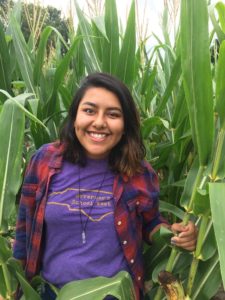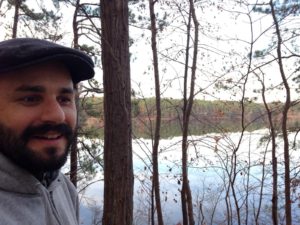
Andy
I’m a doctoral candidate of sociology at North Carolina State University. My research focuses on food systems, which is how I came to be involved with the Witness for Justice Program. I was looking for a way to help farmworkers, who I know are exploited due to the way that our food system operates. Volunteering to go on outreach with Legal Aid connects back to my research and my commitment to making a more just world.
My experiences as a volunteer involved going out and meeting some very hardworking men and women who are in the United States to make money to be able to support their families, and to bring them information that they don’t necessarily have access to.
I think that this is a good opportunity for volunteers and people who want to get involved. Volunteers will learn a lot from the workers and also from the informed staff who can talk about systemic injustices in the farmworker and food production industry.
It is also important to recognize that workers often times come from farming backgrounds themselves (I have had many conversations with workers who talk about living “back home en el rancho”). Farm work is what they know and are experts in; they’re not just mindless workers.
We need to know about this before going into a grocery store. We love the cheap food that we are eating, but we often times don’t realize how hard farmworkers are working, and how we benefit from the exploitation of their labor.
 Maria
Maria
My name is Maria. I am 19 years, and I’m in college. I was interested in volunteering with the Witness for Justice Program because I was motivated by the work of the lawyers and other staff in the Legal Aid office. The Farmworker Unit at Legal Aid brings services that are of crucial need to people who do not have financial resources or transportation, and who are often in fear of speaking up about injustices happening to them.
I would definitely recommend this program to others. The Witness for Justice Program allows volunteers with an opportunity to help and get involved in their community. Sometimes, we think of the people in our community as just our neighbors and the people that we see in the grocery store. But, if we want to call ourselves humanitarians, we have to also be thinking about the lives and labor of those people who work so hard so that we can put food on the table.
The work could be really disheartening at times: we would visit camps and would sometimes see workers being subjected to inhumane living/working conditions, inadequate pay and other injustices. We would want to fix those problems right there on the spot, and it was discouraging to not be able to change these systemic injustices in an instant. However, there were moments when we would meet farmworkers who would tell their story, or when a farmworker would come up to us and say “Hey! I contacted that lawyer that you told me about,” or “Thanks for helping me get access to the resources that I needed!” Those moments allowed me to see how we were really helping people. One person is all that it takes to keep you motivated and energized to work for justice.
 Camilo
Camilo
I am a graduate student, studying to get my PhD in History. I became interested in the Witness for Justice Program because I have always been interested in the working conditions of both people from the US, and also of immigrants who are working in the US.
Overall, being an outreach volunteer was a very positive, but intense experience. It was powerful to see and hear about the resilience of farmworkers in the US, who are often subjected to inhumane and unjust working and living conditions.
Going on outreach was also a very enriching experience, though. Even when our interactions with farmworkers were brief, I was still struck by the power of making that initial human connection with the workers. After going to farm labor camps to provide some information, I was left with the feeling of wanting to do even more work to cooperate with these communities.
On a personal level, my volunteer experience was intense because it led me to reflect on the realities of injustice in the world. Like most of the farmworkers that I met this year, I, too, am from Mexico. Going on outreach led me to think about the injustice of how I come from the same country as so many of the farmworkers in the US, and, yet, our lives are so radically different.
I would definitely recommend the Witness for Justice Program to anyone who is thinking of applying. In addition to making sincere connections with farmworkers, my outreach experience has broadened my understanding of the work that lies behind aspects of life that I consider to be basic. I learned more about the real experiences of people who work and provide us with the food that we all enjoy.
Volunteering with Legal Aid taught me about the real, somber reality of farm work in the US, but my experiences also motivated me to continue volunteering and to search for new ways to offer farmworkers assistance.
